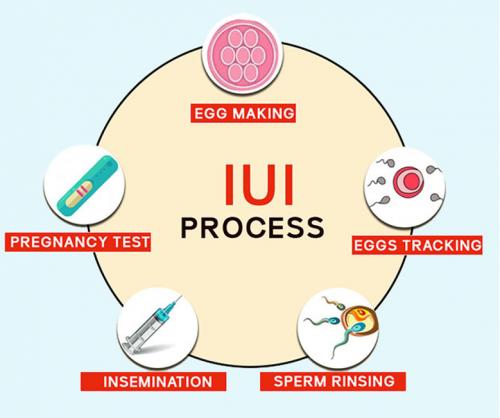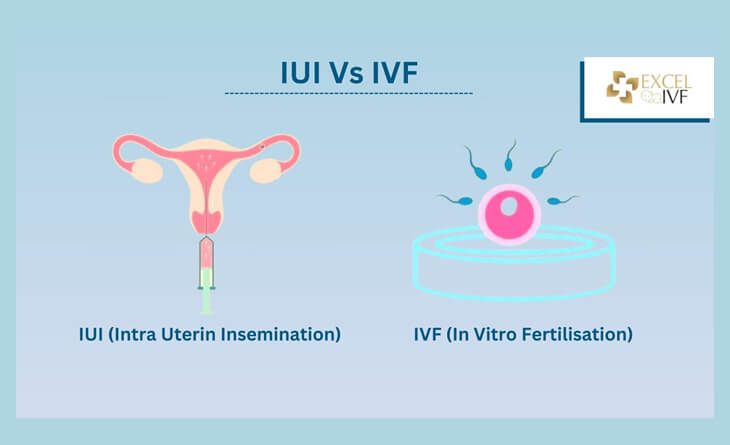What's The Difference Between IUI And IVF?

You have heard about two potential fertility treatments: IUI treatment (intrauterine insemination) and IVF treatment (in vitro fertilization). Both these treatments help couples conceive babies when getting pregnant naturally is challenging. But both these treatments work differently. How? Let’s understand.
IUI (Intrautrine Insemination) Treatment
First, let’s talk about IUI.

IUI is a simple and less expensive fertility treatment. It's not too invasive and focuses on making one or two eggs available for fertilization.
Procedure: Your doctor will collect the semen sample from your husband through masturbation and then wash it to separate the healthy and motile sperm. After washing, the fertility specialist will carefully place it inside uterus through a catheter passed from the uterine opening (cervix), where it can swim up to the egg waiting in the tube for fertilization.
How Does IUI Work? In IUI, your doctor will closely monitor your follicles by means of ultrasound called Follicle Monitoring to determine when the egg is about to be released. When the follicle ruptures, indicating egg release within the next 12 to 24 hours, the fertility specialist performs the insemination procedure.
The best part about IUI treatment is there is no need for extra rest or limitations. You can carry on with your usual activities. However, minimal supportive treatment might be given during the two weeks before checking for pregnancy.
So, the whole process takes place inside your body. The sperm is placed in the right spot, but it's up to nature from there. The sperm must meet the egg, form an embryo, travel down to the uterus, and attach itself. So, you must have healthy and open fallopian tubes because they play a crucial role in this process.
Cost: The cost of IUI can vary, usually between 10 to 15 thousand INR, depending on where you have it done and the specific methods used to stimulate follicle growth.
IUI Success Rate: The success rate of IUI is less than the IVF success rate; it is about 15 to 18%, which means that every month if 6 couples undergo intrauterine insemination, only one gets pregnant. So it is necessary that the procedure is done for 3- 4 months to know whether it is working or not.
When IUI is Recommended: IUI is often recommended as the first step if you have unexplained infertility, mild male factor infertility, or cervical factor infertility or are looking for a less invasive procedure in presence of open fallopian tubes.
IVF (In Vitro Fertilization) Treatment
In the previous section, we have discussed about IUI treatment. Now, we will talk about the IVF procedure.
IVF is the more invasive procedure as compared to IUI.
Procedure: At the start of the process, your doctor will give you a hormonal injection to stimulate your ovaries to produce more eggs. In this procedure, 10 to 12 eggs are required. Therefore, higher doses of injections are given daily. Just like IUI, your IVF specialist in Delhi will monitor the follicles.
Unlike IUI, instead of waiting for the eggs to be released naturally, they are carefully collected through a procedure called egg retrieval. To make the process pain-free, your doctor will give anesthesia to you.
After that, the embryologist will combine the collected eggs with the sperms in the lab. This fusion will result in an embryo (the very first stage of a baby). This embryo is monitored in the lab for three to five days. The embryologist will choose the best-quality (A-grade) embryos and the doctor shall put them into your uterus. The embryo will attach to the uterine lining for a pregnancy to begin.
After the embryo transfer, the care and restrictions are a bit more intense than after IUI. Your IVF specialist in Delhi will provide specific guidelines and restrictions to maximize the chances of successful implantation.
Cost: The overall cost lies between 1,25,000 and 2,50,000 INR based on the clinic and the IVF specialist you have chosen for the procedure.
IVF Success Rate: IVF is a more controlled and advanced procedure than IUI. The entire process of fertilization, embryo formation, and embryo selection occurs in a controlled lab environment. So, it offers a higher success rate, which is typically around 55-60%.
When IVF is recommended: It's often used when there are issues like non-functioning tubes, very low sperm count, or unexplained infertility. If previous attempts with IUI haven't worked, your doctor may consider IVF.
Summing Up!
For a better understanding of the difference between IUI and IVF, see this table:
Characteristic | IUI | IVF |
Invasiveness | Less invasive | More invasive |
Steps Involved | Sperm is collected, washed and injected directly into the uterus | Eggs are retrieved from the ovaries, fertilized in a laboratory dish, and then transferred to the uterus |
Cost | Less Expensive (10 to 15 thousand INR) | More Expensive (1,25,000 and 2,50,000 INR) |
Success Rate | 15-18% | 55-60% |
Who is it for? | Couples with unexplained infertility, mild male factor infertility, and cervical factor infertility and are looking for a less invasive procedure. | Couples with non-functioning tubes, very low sperm count, or unexplained infertility. If previous attempts with IUI haven't worked, your doctor may consider IVF. |
If you are looking for IVF or IUI treatment in Delhi, schedule your consultation with Dr Rhythm Gupta who holds ample experience in treating infertility with the best suitable method for aspiring parents to be.
Post Your Ad Here
Comments